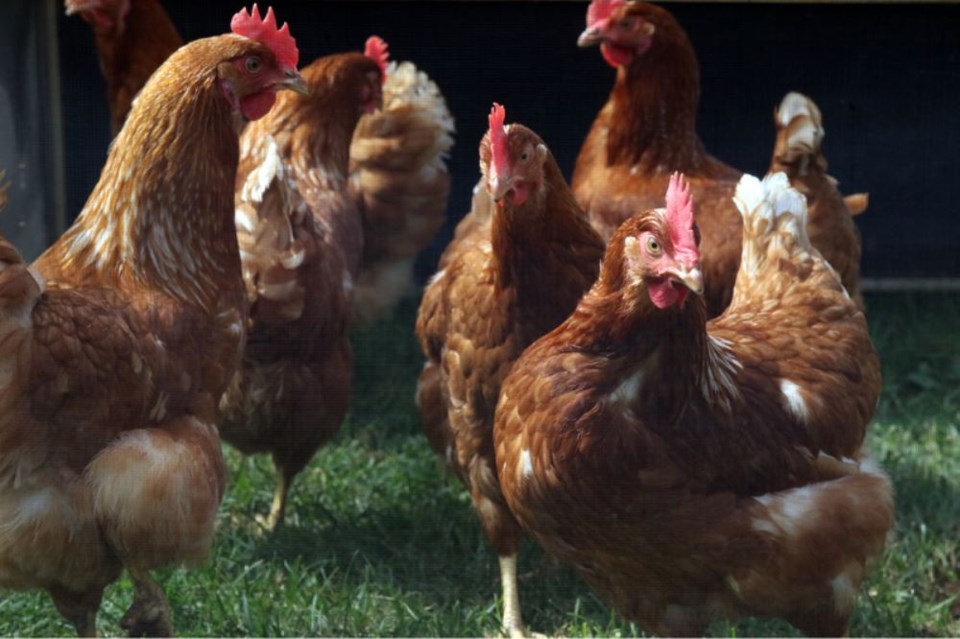THUNDER BAY – A push to allow Thunder Bay residents to keep chickens on urban properties was defeated at city hall four years ago. Now one city councillor is hoping the idea will get more traction, as the COVID-19 pandemic creates greater food insecurity and exposes vulnerabilities in the industrial food system.
Coun. Shelby Ch’ng, who represents the Northwood ward, has filed a motion to revisit the issue that will be heard by council on Monday. She voted in favour of a proposed by-law to allow backyard chickens in 2016, which included restrictions such as a maximum of six hens, no roosters, limits to coop size, minimum distances from adjacent buildings, and rules on manure storage.
Concerns over noise, smell, and disease saw the bylaw fail on an 8-4 vote. With a number of new faces on council, and several – councillors Andrew Foulds, Rebecca Johnson, and Ch’ng – who previously voted in favour, the idea could find more support this time.
Ch’ng adds that the COVID-19 crisis makes local food access more important than ever. Local organizations that provide food aid have reported greater need in the community due to the pandemic.
“Not only [are] people having problems, but our food systems are absolutely being disrupted,” Ch’ng says. “Anything council can do to alleviate that burden on families, I think we should take a really good look at.”
Ch’ng’s concerns are echoed by local food advocates. The Thunder Bay and Area Food Strategy has said the pandemic demands a rethink of our food system, and a move to support localized options they believe provide more resilience.
“Never has the importance of an equitable and resilient food system been so apparent,” the group said in an April statement. “The ‘just-enough, just-in-time’ food system and long supply chains dominated by large corporations are fragile at the best of times. The COVID-19 global pandemic may lead to additional supply shortages, higher food prices, and a widening gap between those with economic means and those living in poverty.”
Ch’ng says allowing urban chickens is a small step on its own, but one in the right direction.
“When you introduce things like this, it gets people in the mindset that we need to start thinking more local,” she says. “I’m hoping it will be one piece in a larger puzzle that will help us build resiliency with our food in the area.”
Other councillors who opposed the idea in 2016 remain skeptical. Red River ward councillor Brian McKinnon doesn’t see himself changing his mind, saying the reading he’s done on the subject indicate there are risks of disease and nuisance to neighbours.
“I’ve read a lot of material, and most of the stuff they talk about is infectious diseases, the fact that not all, but the majority of the owners let [things] go a little bit wild,” he says. “They don’t look after them very carefully, there’s lots of dirt and feces left around.”
McKinnon is skeptical of the food security arguments marshalled in favour of the change, saying it’s likely more expensive to keep chickens than to buy eggs at the store. He adds that he hasn’t had any requests to allow backyard chickens from constituents.
“I don’t know if it’s an urgent need for people to have chickens,” he says. “It may sound romantic to have them in the backyard, teach your kids about eggs and how to take care of animals and so on. Well, there are other ways to do that, I would suggest.”
The councillor says he’d rather see people support local farmers, whose products face an inspection regime in which he’s confident.
“I’m not opposed to the 100-mile diet, I’m very supportive of that,” he says. “But let farmers look after that – we have scores and scores of professional farms within a 10-minute drive.”
Coun. Aldo Ruberto, who also voted against the chickens by-law, didn’t close the door entirely to the idea, saying his primary concerns are around enforcement. He would want to see a licensing system that includes yearly inspections.
